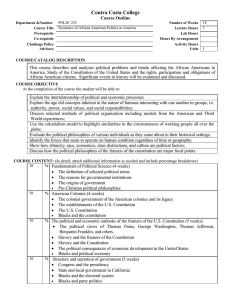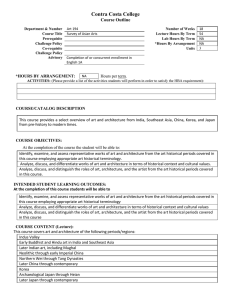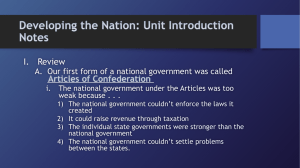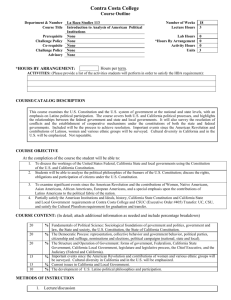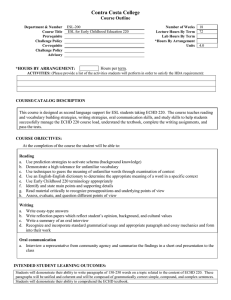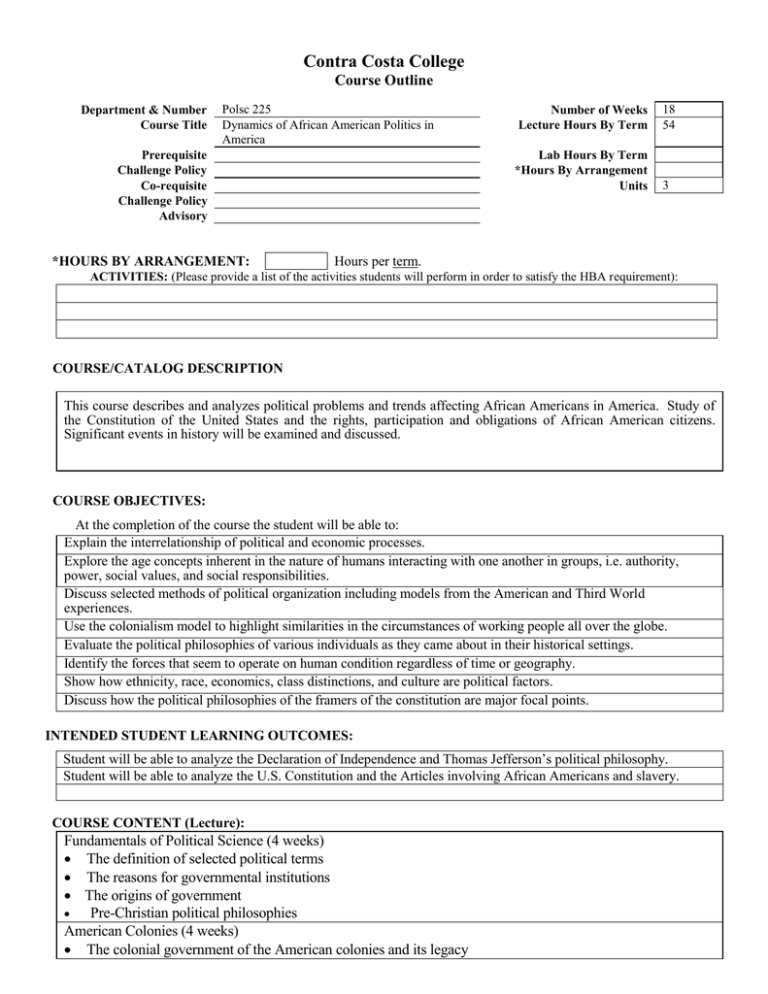
Contra Costa College
Course Outline
Department & Number
Course Title
Polsc 225
Dynamics of African American Politics in
America
Prerequisite
Challenge Policy
Co-requisite
Challenge Policy
Advisory
*HOURS BY ARRANGEMENT:
Number of Weeks
Lecture Hours By Term
18
54
Lab Hours By Term
*Hours By Arrangement
Units
3
Hours per term.
ACTIVITIES: (Please provide a list of the activities students will perform in order to satisfy the HBA requirement):
COURSE/CATALOG DESCRIPTION
This course describes and analyzes political problems and trends affecting African Americans in America. Study of
the Constitution of the United States and the rights, participation and obligations of African American citizens.
Significant events in history will be examined and discussed.
COURSE OBJECTIVES:
At the completion of the course the student will be able to:
Explain the interrelationship of political and economic processes.
Explore the age concepts inherent in the nature of humans interacting with one another in groups, i.e. authority,
power, social values, and social responsibilities.
Discuss selected methods of political organization including models from the American and Third World
experiences.
Use the colonialism model to highlight similarities in the circumstances of working people all over the globe.
Evaluate the political philosophies of various individuals as they came about in their historical settings.
Identify the forces that seem to operate on human condition regardless of time or geography.
Show how ethnicity, race, economics, class distinctions, and culture are political factors.
Discuss how the political philosophies of the framers of the constitution are major focal points.
INTENDED STUDENT LEARNING OUTCOMES:
Student will be able to analyze the Declaration of Independence and Thomas Jefferson’s political philosophy.
Student will be able to analyze the U.S. Constitution and the Articles involving African Americans and slavery.
COURSE CONTENT (Lecture):
Fundamentals of Political Science (4 weeks)
The definition of selected political terms
The reasons for governmental institutions
The origins of government
Pre-Christian political philosophies
American Colonies (4 weeks)
The colonial government of the American colonies and its legacy
The establishments of the U.S. Constitution
The U.S. Constitution
Blacks and the constitution
The political and economic outlooks of the framers of the U.S. Constitution (5 weeks)
The political views of Thomas Paine, George Washington, Thomas Jefferson, Benjamin Franklin, and
others.
Slavery and the framers of the Constitution
Slavery and the Constitution
The political consequences of economic development in the United States
Blacks and political economy
Structure and operation of government (5 weeks)
Congress and the presidency
State and local government in California
Blacks and the electoral system
Blacks and party politics
COURSE CONTENT (Lab):
METHODS OF INSTRUCTION:
Lecture and classroom discussions
Films and videos
Library research
INSTRUCTIONAL MATERIALS:
NOTE: To be UC/CSU transferable, the text must be dated within the last 7 years OR a statement of justification for a text beyond the
last 7 years must be included.
Textbook Title:
Author:
Publisher:
Edition/Date:
Justification Statement:
Textbook Reading Level:
American Politics and the African American Quest for Universal Freedom
Hanes Walton and Robert C. Smith
Pearson/Longman
6th edition 2012
(For textbook beyond 7 years)
13
Lab Manual Title (if applicable):
Author:
Publisher:
Edition/Date:
OUTSIDE OF CLASS WEEKLY ASSIGNMENTS:
Title 5, section 55002.5 establishes that a range of 48 -54hours of lecture, study, or lab work is required for one unit of credit.
For each hour of lecture, students should be required to spend an additional two hours of study outside of class to earn one
unit of credit.
State mandates that sample assignments must be included on the Course Outline of Record.
Outside of Class Weekly Assignments
Hours per week
Weekly Reading Assignments (Include detailed assignment below, if applicable)
3
For test #1- Read Chapter 1 and 2 in the required textbook and take notes
Weekly Writing Assignments (Include detailed assignment below, if applicable)
3
Complete study guide #1 which includes vocabulary work, people to profile, and ten themes. The themes require
information from the textbook and one outside source.
Weekly Math Problems (Include detailed assignment below, if applicable)
Lab or Software Application Assignments (Include detailed assignment below, if applicable)
Other Performance Assignments (Include detailed assignment below, if applicable)
STUDENT EVALUATION: (Show percentage breakdown for evaluation instruments)
Course must require use of critical thinking, college-level concepts & college-level learning skills.
For degree credit, course requires essay writing unless that requirement would be inappropriate to the course objectives. If writing
is inappropriate, there must be a requirement of problem-solving or skills demonstration.
40 % Essay (If essay is not included in assessment, explain below.)
40
20
%
%
Computation or Non-computational Problem Solving Skills
Skills Demonstration
%
Objective Examinations
Other (describe)
Three essay tests and a final exam of ten questions in the essay format.
Group and oral presentations
%
%
%
GRADING POLICY: (Choose LG, P/NP, or SC)
Letter Grade
90% - 100% = A
80% - 89% = B
70% - 79% = C
60% - 69% = D
Below 60% = F
Pass / No Pass
70% and above = Pass
Below 70% = No Pass
Prepared by: Carolyn E. Hodge
Date: May 2014
Revised form 01/14
x
Student Choice
90% - 100% = A
80% - 89% = B
70% - 79% = C
60% - 69% = D
Below 60% = F
or
70% and above = Pass
Below 70% = No Pass

